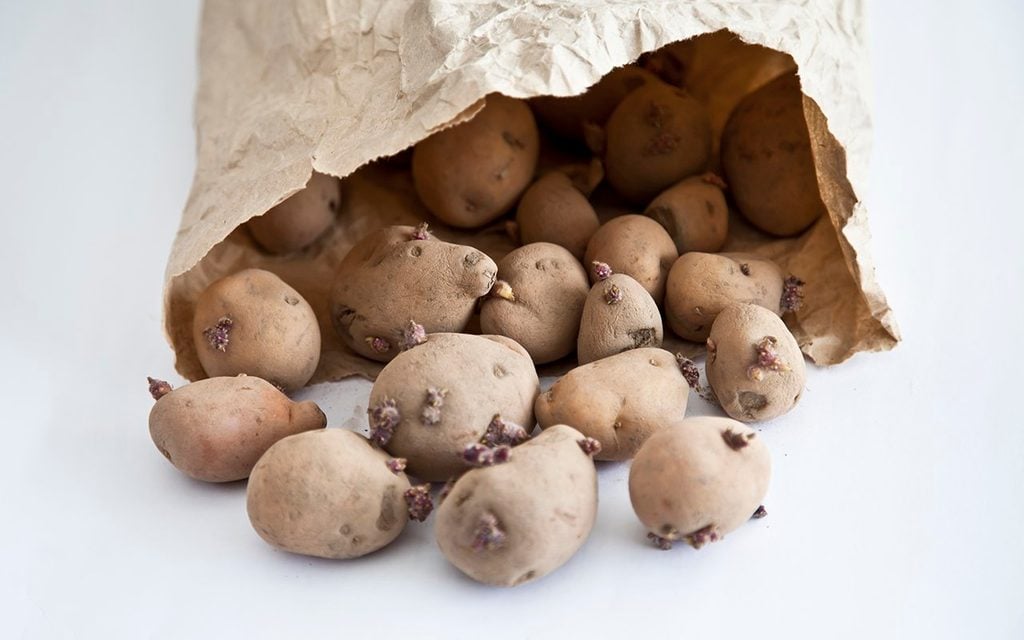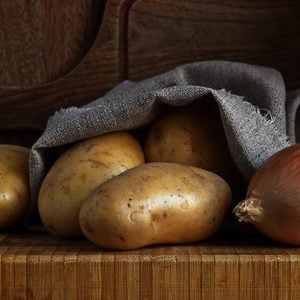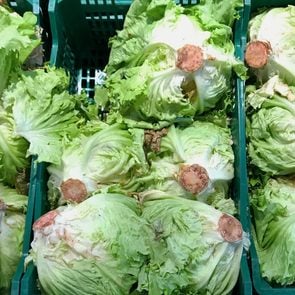Is It Safe to Eat Sprouted Potatoes?
Updated: Nov. 08, 2022

You’re about to start cooking dinner when you notice some unwelcome sprouts on your potatoes. Are sprouted potatoes still safe to eat? Plus, find out how to keep your potatoes from growing sprouts in the first place.
We’ve all been there: You see a giant bag of potatoes on sale at the grocery store and jump on it. You can always whip up some delicious potato recipes, right? But what happens when your potato sprouts little green roots? Are those spuds still safe to eat?
Can you eat sprouted potatoes?
Sprouted potatoes follow the same food safety rules as any other aging produce: When in doubt, throw it out. According to the National Capital Poison Center, it’s best to throw away potatoes that have already sprouted. That’s because the sprouts are a sign that your potatoes contain higher levels of unsafe toxins than fresh ones do. Find out what foods are OK to eat moldy (and which are not), too.
All potatoes contain natural toxins called glycoalkaloids; specifically, solanine and chaconine. “The glycoalkaloid content of a potato increases as it sprouts,” explains Melissa Collins, Partnership Manager at Perfect Brew. “As a result, eating sprouted potatoes may lead you to consume an excessive quantity of these chemicals.” You might also notice your old potatoes turning green. That’s because light can also increase the potato’s chlorophyll, the compound that gives plants their green color. If your potatoes are green, chlorophyll isn’t dangerous, but it’s a sign that the toxins have increased, too.
These toxins live on the potato’s skin and sprouts; the white flesh of the potato contains much less.
What are the risks of eating sprouted potatoes?
“Symptoms might develop anywhere from a few hours to a day after eating sprouting potatoes,” Collins explains. While it would take multiple servings of any potato recipe to feel the effects of these toxins, they can cause vomiting, diarrhea, and abdominal pain. Symptoms are usually mild but can be more severe in some people. “They can induce low blood pressure, a fast pulse, fever, headaches, disorientation, and in rare circumstances, death if eaten in excessive doses,” Collins specifies.
Storage tips to avoid sprouted potatoes
“Avoiding hoarding potatoes and only purchasing them when you want to use them is one of the greatest methods to prevent sprouting,” Collins suggests. Peeling your potatoes before you cook them can also help to drastically decrease the number of toxins you’re exposed to, especially if the potatoes already have a green tinge. You can also use a small knife or a potato peeler with an eye remover to dig out any sprouts. Removing eyes, sprouts, and discolored or softened skin can reduce the risk of ingesting toxins, but may not help you avoid it entirely. Check out the risks of eating expired eggs, too.
The best way to enjoy endless potato recipes is to prevent sprouts and green discoloration in the first place. Potatoes are more likely to sprout when placed in direct light and in low temperatures. It’s best to keep them off the kitchen counter where they could be in direct sunlight, as well as away from the cold temps of the fridge. “Removing damaged potatoes and ensuring that the remaining ones are completely dry before keeping them in a cold, dry, dark area might help to decrease the chances of sprouting,” says Collins.
These stackable baskets are ideal for tight storage spaces like the pantry or cabinet. Keep them away from onions, as the gases from those veggies could speed up the sprouting process. And while those giant bags of spuds are tempting for their cost savings, it’s safer to buy your potatoes as needed instead. If you need to buy potatoes in bulk, consider storing them in a breathable, cotton storage bag.
Use the sprouts!
Once you’ve removed sprouts from sprouted potatoes, you actually don’t have to toss them! Amy Leigh Mercree, holistic health expert and bestselling author of 16 books including The Healing Home: A Room-by-Room Guide to Positive Vibes, suggests planting them, “especially if they have an eye included,” she told RD.com. “Plant them in the ground at the correct time (usually early spring) and the sprouts will grow new potatoes for you.” She add that you’ll need the right type of soil for this—it needs to be able to drain well. “Too much water causes rotten potatoes,” she warns. “You also want to make sure the potatoes are in soil that doesn’t reach a high temperature and remains nice and cool.” Learn more about how to grow potatoes.
For another, uh, burning food question, is it safe to eat food with freezer burn?
Sources:
- National Capital Poison Center: “Are Sprouted Potatoes Safe?”
- Melissa Collins, Partnership Manager at Perfect Brew
- Amy Leigh Mercree, holistic health expert and bestselling author



